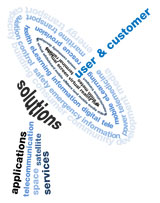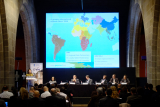Advances made in the fields of science, medicine and technology have contributed to the prevention and treatment of disease, improving the quality and expectancy of life. However, billions of people living in underdeveloped countries do not benefit from these improvements.
SAFE Haiti is a project designed for regions where access to health care is challenged due to insufficient health personnel and expertise, lack of infrastructures, communication and information.
Introduction
The massive earthquake that affected areas surrounding Port-au-Prince in January 2010 has left its mark on the population, emphasising existing healthcare challenges. Two years later, there are regions in the country where communities cannot access a health unit in a timely manner. This scenario is common to many other regions around the world.
Access to accurate and timely information is crucial in healthcare. The distances that have to be travelled without knowing whether the appropriate expertise and medication is available accounts for some of the barriers from a patient.s point-of-view. From a national health system.s perspective, knowing what is occurring where provides important information for informed decision-making to help direct the proper resources and ultimately save lives.
The Pilot Study
The Institute for Space Medicine (MEDES) in France and Local Insight Global Impact (LIGI) in Portugal have successfully concluded a 5-month pilot project of an innovative health initiative - SAFE Haiti - funded by ESA and LIGI.
The system is based on an interface for smart and satellite phones and aims at ensuring universal community health outreach, epidemiological surveillance and outbreak prevention in real time.
Due to its intuitive interface, anyone anywhere can be trained to report symptoms and signs. As complex information is packed into an SMS, the costs are kept to a minimum, and the information can be sent by any phone, including satellite phones. The data can then be accessed by local and national health systems via an internet portal. Feedback on what action to take can be given within a few minutes.
The system also allows for geo-referencing thanks to satellite navigation signals, and is flexible enough to be adapted to other regions, and to focus either on specific pathologies, or to conduct general triages.
The pilot system was deployed in Carrefour and relied on 10 school teachers from urban and rural areas in the region, with the support of community leaders. The main objectives were to understand the interface usability, the capacity to train non-health professionals in its use, and to provide insights for integration at local and national levels.
The video below showcases the training and usage of the system by non-health professionals (teachers) in Carrefour, Haiti.
During the 5-month proof-of-concept a total of 4304 symptom declarations were entered by the 10 teachers. We have shown that the interface is easy to use, and that non-health professionals (in this case teachers from rural and urban areas in Carrefour) can be trained to use the system. In particular, geo-tagging of symptom records thanks to satellite navigation signals, simplified the data collection process.
A significant share of the Haitian population is still not covered by terrestrial means, and satellite communication is deemed indispensable to scale up the system nation-wide. In addition, Haiti is very exposed to hurricanes and earthquakes, which lead to major losses in the capacity of terrestrial communication assets. In those emergency situations satellite phones prove invaluable. The local health centre has emphasised the value added of this system to their work, particularly if coupled with a mobile clinic.
Furthermore, real time data can help detect trends in symptoms and signs and lead to early detection of potential outbreaks. From an epidemiological perspective, the data generated can identify trends in regions.
The project was focussed on a technical and acceptability assessment and was carried out successfully. Subsequent phases of this system may include all health units, care providers (including organisations), relevant authorities and pharmacies.
It can ultimately make basic healthcare more universal by making a more efficient and cost-effective use of resources, information and knowledge. Due to the context in Haïti, an operational service has to rely on the programs of donors. First contacts have been taken to ensure a sustainable follow up of the SAFE Haïti project.
More Information
For more information about the work please visit MEDES and LIGI´s websites.




 The ARTES 3-4 Satcom Applications programme has been created to support applications projects related to satellite telecommunications either originated by industry or in response to specific applications calls initiated by ESA. It aims to improve the competitive position of industry in ESA member states in the field of satellite telecommunications and in their associated utilisation. Being an element of the ARTES (Advanced Research in Telecommunications Systems) programme it has successfully contributed to the development, qualification, and demonstration of applications since 1998.
The ARTES 3-4 Satcom Applications programme has been created to support applications projects related to satellite telecommunications either originated by industry or in response to specific applications calls initiated by ESA. It aims to improve the competitive position of industry in ESA member states in the field of satellite telecommunications and in their associated utilisation. Being an element of the ARTES (Advanced Research in Telecommunications Systems) programme it has successfully contributed to the development, qualification, and demonstration of applications since 1998. More than 75 participants from SMes all over Europe attended the IAP Ambassador Platform for Small and Medium-sized Enterprises (APsme) launch event in Brussels on 6 March.
More than 75 participants from SMes all over Europe attended the IAP Ambassador Platform for Small and Medium-sized Enterprises (APsme) launch event in Brussels on 6 March.

 The Satellite-enhanced eHealth for sub-Saharan Africa (eHSA) Programme intends to deliver economically sustainable eHealth services in sub-Saharan Africa (SSA). The programme.s to federate stakeholders from various organizations along the service provision chain will shape its success. This portal serves as a tool facilitating exchange of news, contacts and discussion among the stakeholders.
The Satellite-enhanced eHealth for sub-Saharan Africa (eHSA) Programme intends to deliver economically sustainable eHealth services in sub-Saharan Africa (SSA). The programme.s to federate stakeholders from various organizations along the service provision chain will shape its success. This portal serves as a tool facilitating exchange of news, contacts and discussion among the stakeholders.